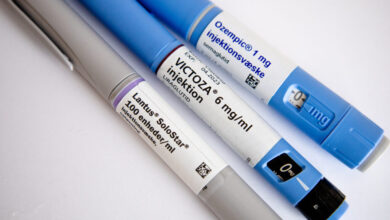Pfizer, Medivation, Aera, and Azalea

Want to stay on top of the science and politics driving biotech today? Sign up to get our biotech newsletter in your inbox.
Hello, everyone. Damian here with an update on the biotech market, a look at the future of genome editing, and the evolving definition of “insider trading.”
Biotech is back where it started
After a volatile three months marked by some J.P. Morgan enthusiasm and a few multibillion-dollar deals, biotech stocks are trading almost exactly where they started the year.
The closely watched XBI biotech index closed at $90.40 yesterday, just 17 cents higher than back on Jan. 2. The XBI rose by as much as 14% back in February, driven by a series of acquisitions and a prevailing sense that more were in the cards. When those deals didn’t materialize, biotech gradually declined through March. Now, at the outset of the second quarter, it has entirely flattened.
The good news, after 2023’s protracted downturn, is that the sector hasn’t crashed. The XBI is up about 19% over the last 12 months and nearly 40% since hitting a six-year low in October.
The quest to make CRISPR more precise
The world’s top gene editing labs seem less interested these days in developing new gene editors than in devising new systems for safely delivering those editors to the right cells in a patient. Feng Zhang launched a startup called Aera, built around cargo-ferrying particles hidden inside the human genome. Jennifer Doudna has quietly launched a company, Azalea, that uses particles made from the hollowed out husks of viruses.
And, as STAT reported last year, David Liu has raised $100 million from several blue-chip firms for a startup called Nvelop, similarly based on engineered viral husks. Today, Nvelop announced it is coming out of stealth. The company, led by former Bluebird executives Jeff Walsh and Melissa Bonner, wouldn’t say much about its future, such as the diseases it would target or when the technology might be ready for trials. But Nvelop did say it has made progress on making Liu’s virus-like particles at scale — a key hurdle for any new platform — and had also acquired a gene delivery technology from Keith Joung, another prominent researcher.
The goal is to build a system that can safely slide even large CRISPR systems into specific cell types. Today, companies can only reliably deliver CRISPR to the liver and even then not without risk. “The delivery technologies that are available to the field as it is today — they can address a certain swath of disease indications, but they really can’t effectively cover it all,” said Bonner. With these two technologies, “I think that we have a tremendous opportunity in front of us.”
Pfizer’s plot to win the RSV vaccine race
Pfizer has signaled it wants to expand the market for its RSV vaccine, Abrysvo, to adults 18 to 59 who have chronic health conditions that put them at higher risk if they contract respiratory syncytial virus.
The company said Tuesday that topline data from its MONeT trial — a safety and immunogenicity trial involving 681 volunteers — showed that the vaccine generated as strong an immune response in adults under the age of 60 who have chronic conditions as it does in adults 60 and older. The vaccine was well tolerated in the younger adults, the company said. Pfizer said it would file the data with regulatory agencies and seek an expansion of its existing licenses, which are for adults 60 and older.
GSK, its rival in the RSV sphere, has already applied to the FDA for an extension of the license for its vaccine, Arexvy, to include adults 50 to 59 years old at increased risk from RSV. Furthermore, GSK used a priority review voucher to speed the application’s path through the FDA, which must rule by June 7. Although it is asking for a smaller extension, age-group wise, its two-month lead time and accelerated review could give GSK an important advantage, allowing the Centers for Disease Control and Prevention’s expert vaccine advisory group to vote to recommend use of Arexvy in people 50 through 59 at a scheduled June meeting — in time for a fall vaccine push in advance of the next RSV season.
Expanding the use of RSV vaccines will undoubtedly raise a debate about the risks and benefits in younger adults, given that there appears to be an association between receipt of these vaccines and a neurological condition known as Guillain-Barré syndrome. GBS triggers muscle weakness and sometimes paralysis. Most people fully recover over time, but some sustain permanent nerve damage. A spokesperson for Pfizer said there were no GBS-like events in the MONeT trial.
Biotech is innovating in insider trading
If you work at a biotech firm, it’s unquestionably illegal to buy your company’s stock after you learn of a not-yet-public plan for it to be acquired. But is it illegal to buy shares of a competing firm with no stake in the merger?
The answer is yes, according to the jury that convicted a former Medivation executive for doing just that. The case dates back to 2016, when a business development leader at Medivation learned that Pfizer had agreed to acquire his company. He then bought more than $100,000 worth of options on Incyte, one of Medivation’s competitors, reasoning that the company’s stock would go up once the buyout news was public. He was right and doubled his money in the process.
Then he spent two years fighting the SEC, which argued that while he didn’t commit any classical forms of insider trading, his investment in Incyte was based on information not known to the public and thus broke the law. And now his conviction represents a meaningful expansion in the SEC’s ability to police the market.



